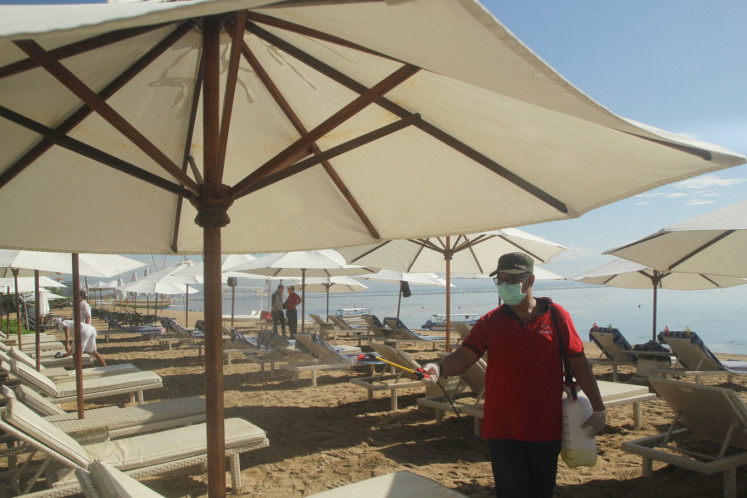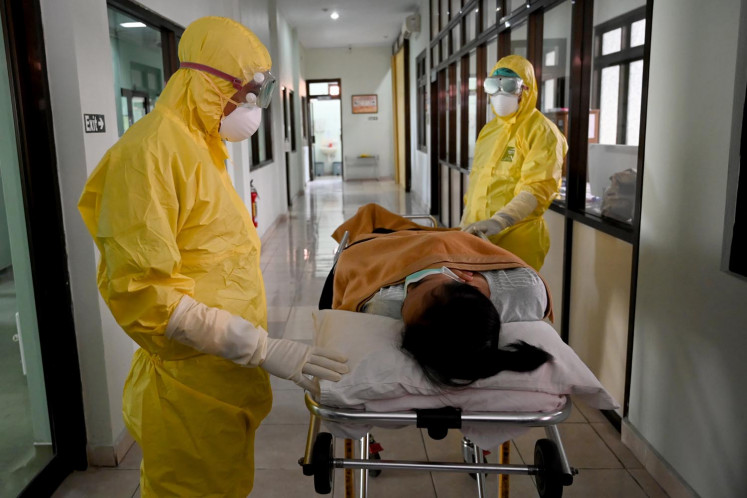Popular Reads
Top Results
Can't find what you're looking for?
View all search resultsPopular Reads
Top Results
Can't find what you're looking for?
View all search resultsCOVID-19: As Jakarta braces for lockdown, Bali reports zero local transmissions
The number of COVID-19 cases in Bali is “scientifically odd”, an expert says.
Change text size
Gift Premium Articles
to Anyone
A
s Jakarta braces for a soft lockdown after recording more than 200 COVID-19 cases with 18 deaths, Bali, a hot spot for international tourists, has reported only four confirmed cases. And not a single of them is a local transmission.
In the first weeks since the Health Ministry announced the first case of local transmission of the novel coronavirus on March 2, both the ministry and Balinese authorities had insisted the province only had one case: a British tourist known as Case 25 who died at Sanglah Hospital and was only known to have COVID-19 after her death. She was defined as an imported case, not a local transmission.
The dearth of cases on the resort island, which receives more than 5 million foreign tourists annually, including from China’s Wuhan, the epicenter of the outbreak, has baffled many, given the fact that it was heavily exposed to the disease.
On Friday, when it became clear that a community spread had taken place in Jakarta and its satellite cities, the government finally announced that Bali had recorded three new confirmed cases, but they were all from outside the province.
The first case is a foreign tourist from France, the second is Balinese who just returned from Italy and the third case is Balinese who just returned from Jakarta. The capital, meanwhile, recorded the highest number of new cases at 32, bringing its total to 215 or about 58 percent of the total cases nationwide.
The number of cases in Bali is “scientifically odd”, an expert says.
Gusti Ngurah Mahardika, a virologist at Udayana University in Bali, doubted both the government’s transparency and its ability to detect COVID-19, saying the low number of cases in Bali did not seem right given how infectious diseases work.
Read also: With low test rates, COVID-19 spreads in shadows
“If we look at the pattern of the disease, it is impossible [for Bali] not to report any local transmissions at this stage, as it is impossible for infected patients not to have had direct contact with other people while in Bali,” he told The Jakarta Post on Friday.
Before the government announced the country’s first two COVID-19 cases on March 2, Bali was the first region in Indonesia to have been linked to a number of confirmed foreign cases.
A week before Jokowi’s announcement, New Zealand confirmed its first coronavirus case of a female citizen in her 60s who had traveled from Tehran to Auckland via Bali. A Chinese national identified as Jin reportedly visited Bali in late January and tested positive for COVID-19 days after he went back to his home country.
Sterilization: A worker sprays disinfectant at Sanur Beach, Denpasar, Bali, on Sunday, March 15, 2020. The Bali administration carried out simultaneous sanitation efforts in cities and regencies across the province by spraying disinfectant in ports, terminals, hotels, markets, tourism objects and public spaces as part of its effort to contain the spread of COVID-19. (JP/Zul Trio Anggono)Bali has been hit hard by the coronavirus outbreak, with many tourists canceling their trips to the resort island despite earlier claims that it is virus-free.
Read also: Tour guides hit hard as COVID-19 strangles tourist destinations
Mahardika said there were likely more undetected cases spread across Bali and argued that the government should have a more rigorous contact tracing method to suppress possible local transmissions.
“It is like the tip of the iceberg. The pattern for infectious diseases like this is that many cases do not show clinical symptoms, only about 10 percent do,” he said.
The academic said the government needed to open up all of its data, including how many tests it had carried out in each province. It was also important for it to detail the imported and the community transmissions in each province, he added.
The Health Ministry’s disease control and prevention director general, Achmad Yurianto, confirmed that the three new cases in Bali were not local transmissions, saying that “one of them was a Balinese who had returned from Jakarta after his office closed”.
While Bali has yet to report a single local transmission, the province, like Jakarta, has been suspected of “exporting” cases to other regions.
A resident doctor from the University of Airlangga has tested positive for COVID-19 after working at Sanglah General Hospital, the main referral hospital for the disease in Bali.
The doctor worked at Sanglah Hospital in Denpasar between March 2 and 15. The doctor had been hospitalized at the Dr. Soetomo Regional General Hospital in Surabaya, East Java.
Sanglah Hospital reported the death of a 53-year-old British woman from COVID-19 on March 9. However, Bali Health Agency head Ketut Suarjaya said it could not conclude whether the doctor had contracted the disease from her.
"We cannot make that conclusion," Ketut told the Post via text message on Friday. "We are currently conducting contact tracing."
Health workers wearing protective gear take part in an exercise in handling a suspected patient at Sanglah hopital in Denpasar, Indonesia's resort island of Bali, on February 12, 2020. (AFP/Sony Tumbelaka)The Bali taskforce for COVID-19, which held a press conference shortly after Yurianto in Jakarta, initially reported only one case in the province.
Of the 69 suspected cases whose tests have been concluded, 68 tested negative and one tested positive, said Dewa Made Indra, who leads the task force.
About 20 minutes later, the task force held another press conference confirming reports from the Health Ministry, saying it had traced the close contacts of all three new cases in the province.
Made revealed that the close contacts were currently self-quarantined at home and their swab samples had been sent out for testing.
“We came across 199 people during the trace. We educated them on how to follow the [COVID-19] protocol. We hope they will take care of their health and limit themselves from others,” he said.












